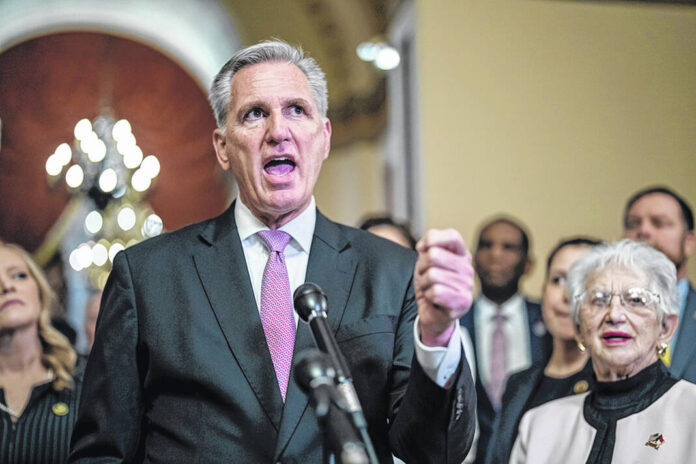WASHINGTON — House Speaker Kevin McCarthy, R-Calif., said Tuesday he’s increasingly concerned about President Joe Biden’s unwillingness to negotiate on lifting the nation’s borrowing authority, saying in a letter to the president that the White House position could “hold dire ramifications for the entire nation.”
Rather than open direct talks on the debt ceiling, which the Democrats agree must be raised, Biden and his party’s lawmakers are challenging Republicans to publicly present their own budget proposals — something McCarthy has so far declined to do.
For now, the Treasury Department has resorted to “extraordinary measures” to avoid default on the nation’s $31.4 trillion borrowing authority. But those measures will run out — and put the U.S. at risk of being unable to pay all of its bills — possibly as early as June.
The White House has emphasized that Biden is not willing to entertain proposed cuts in programs simply in exchange for lifting the debt limit. But McCarthy and Republicans are insisting he must for debt ceiling legislation to move ahead. The two sides are on a slow-motion collision course that could have negative implications for the economy.
“Nearly two month ago, you and I sat down to discuss a path forward on the debt limit,” McCarthy wrote in a letter to Biden dated Tuesday. “Since that time, however, you and your team have been completely missing in action on any meaningful follow-up to this rapidly approaching deadline.”
He also told Biden, “Simply put: You are on the clock. It’s time to drop the partisanship, roll up our sleeves, and find common ground on this urgent challenge. Please have your team reach out to mine by the end of this week to set a date for our next meeting.”
Show your plans, the White House responds, believing that many voters would not look favorably on the proposed cuts.
“It’s time for Republicans to stop playing games, pass a clean debt ceiling bill, and quit threatening our economic recovery,” said White House press secretary Karine Jean-Pierre. “The president welcomes a separate conversation about our nation’s fiscal future.”
So far, only the House Freedom Caucus, which includes many of the House’s most conservative members, has put forward a blueprint, which includes returning to fiscal year 2022 spending levels and allowing for 1% annual growth after that for the next 10 years. The plan also includes rolling back an estimated $400 billion in Biden’s student loan relief and clawing back all unspent COVID-19 funds.
The White House has seized on those Freedom Caucus proposals, saying they would lead to draconian cuts that would endanger Americans’ safety, such as cutting federal support for local law enforcement, scaling back rail safety inspections and jeopardizing safety at U.S. airports while increasing wait times at TSA security check points.







